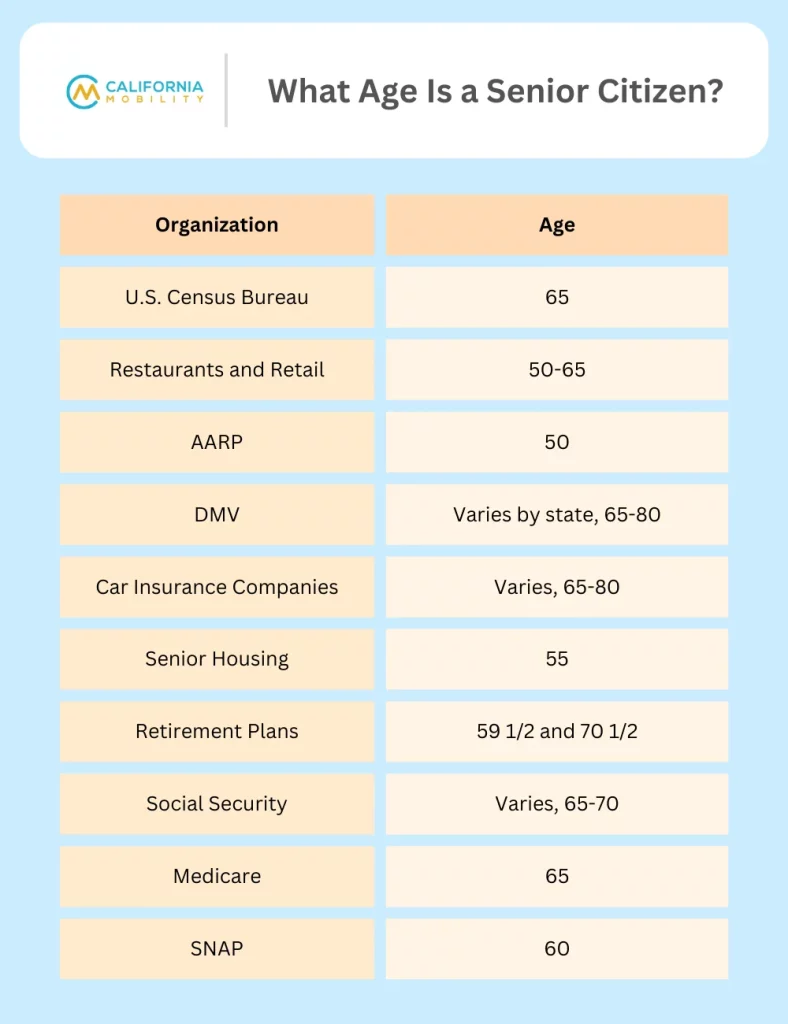What Age Is A Senior Citizen?

Table of Contents
- U.S. Census Bureau
- Restaurant and Retail Discounts
- American Association for Retired Persons (AARP) & Other Organizations for Retired People
- Department of Motor Vehicles (DMV)
- Car Insurance Companies
- Senior Housing
- Retirement Plans (401K, IRA, Roth IRA, etc.)
- Social Security
- Medicare
- Supplemental Nutrition Assistance Program (SNAP)
There are so many programs, discounts, and other benefits for senior citizens, and it makes sense to take advantage of some of these perks that come along with getting older. But how do you know when you officially become a senior citizen?
Many people associate retirement with senior status, and most people retire between 60 and 70 years of age, but the term “senior citizen” is subjective. While some people may consider those who are 50 or 55 to be seniors, others may think 65 is the magic number. So how do you when you are a senior?
There is no universally accepted age requirement for someone to meet to be deemed a senior. Companies and organizations all set their own age limits to classify people as seniors, depending on their specific requirements and the types of services or products they provide.
Below are several organizations that cater to seniors, along with the ages they set for consumers to receive their services or benefits.

U.S. Census Bureau
Age: 65
According to the U.S. Census Bureau, people who are aged 65 and older are part of the “older population” category for the purposes of data collection and reporting.
Restaurant and Retail Discounts
Age: Varies – usually 50 – 65
The age to receive senior citizen discounts at restaurants and other retailers varies according to each retailer’s policy. Some senior discounts are available for those with an AARP card, so these seniors would be aged 50 and older since that’s age AARP’s requirement. Other establishments have age requirements of 55, 60, or 65 years of age.
American Association for Retired Persons (AARP) & Other Organizations for Retired People
Age: 50
AARP provides its members with a variety of discounts on products and services, such as hotel accommodations, restaurants, car rentals, and travel arrangements. The American Seniors Association and the Association of Mature American Citizens are organizations that provide benefits similar to AARP. All of these organizations offer memberships to those who are aged 50 and up.
Department of Motor Vehicles (DMV)
Age: Varies by state – usually 65 – 80
There are special requirements that apply to senior citizens renewing their drivers’ licenses. These requirements are designed to prevent people with poor vision, perception limitations, or slow reflexes from driving. Each state sets its own requirements, which may include a vision screening or driving tests for those over a certain age.
For example, in California, seniors can’t have their licenses taken away solely because of their age, but those who are aged 70 or older can be required to meet certain requirements.
Car Insurance Companies
Age: Varies – usually 65 – 80
Car insurance companies tend to increase their premium rates for senior citizens. For some companies, rates may increase slightly at age 65. By the age of 80, rates tend to skyrocket, but requirements vary according to each company. If your insurance company raises your rates too high, you should shop around for better rates.
More than 30 states, including California, require insurance companies to provide a discounted rate to those aged 55 and up who take approved driving courses.
Senior Housing
Age: 55
The Fair Housing Act prohibits discrimination in housing, but includes exemptions for “Housing for Older Persons.” This applies to apartments or housing communities for those aged 55 and up. Senior living apartments, condos, or housing communities have the right to refuse to sell or rent homes to families with minor children if they meet certain criteria, such as the intent to operate as a senior living community and being solely occupied by seniors.
Retirement Plans (401K, IRA, Roth IRA, etc.)
Age: 59 ½ and 70 1/2
If you withdraw money from your 401K or IRA before you are 59 ½, you may be responsible for paying a 10% early withdrawal penalty. There are required minimum amounts that you must withdraw at 70 ½ years of age. There is also a required minimum distribution, which uses a formula to determine how much money you must withdraw on a regular basis.
This amount factors in your age, life expectancy, and the amount of money you have in savings. If you don’t comply with withdrawing the appropriate amount, you may have to pay a penalty.
Social Security
Age: Varies according to the year you were born – 65 – 67
With people living longer today than they did then, the age to receive full social security benefits has gotten older. The age you must be to receive benefits depends on the year you were born, so if you were born in or before 1937, your retirement age is 65, and if you were born in or after 1960, your retirement age is 67. You can also choose to draw social security retirement funds at a reduced rate as early as age 62.
Medicare
Age: 65
Medicare is the federal health insurance program for seniors. You are eligible for Medicare health care coverage when you reach age 65, and you need to start the application process four months before your 65th birthday so ensure you are covered by your birthday. Medicare is not a free program, so there is an out-of-pocket cost for seniors, including monthly premiums and deductibles. The amount varies according to the type of plan you choose.
Supplemental Nutrition Assistance Program (SNAP)
Age: 60
SNAP provides resources for food assistance for low-income people and families. You must be aged 60 or older to be eligible for this federal food assistance program based on your age, which may allow you to qualify even if you have a higher gross income than those who are younger may have. Eligibility is based on your income and assets, as well as the number of people living in your home.
Resources
https://www.insurance.com/auto-insurance/auto-insurance-basics/senior-drivers.html
https://www.aarp.org/membership/faqs
https://www.hud.gov/program_offices/fair_housing_equal_opp/fair_housing_act_housing_older_persons
https://www.medicare.gov/your-medicare-costs/medicare-costs-at-a-glance
https://www.fns.usda.gov/snap/eligibility/elderly-disabled-special-rules
https://www.freshebt.com/state/california/food-stamps-eligibility-income-limits






